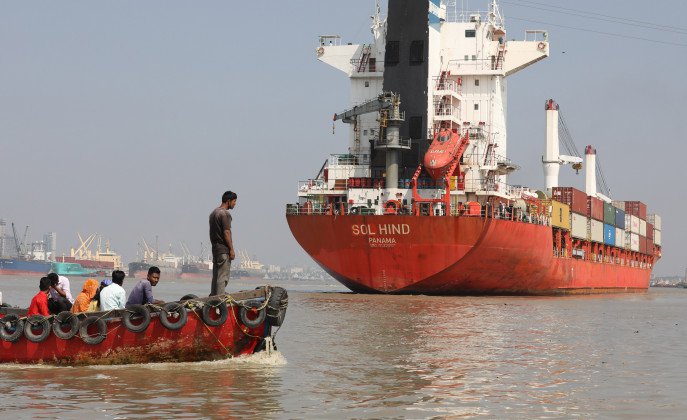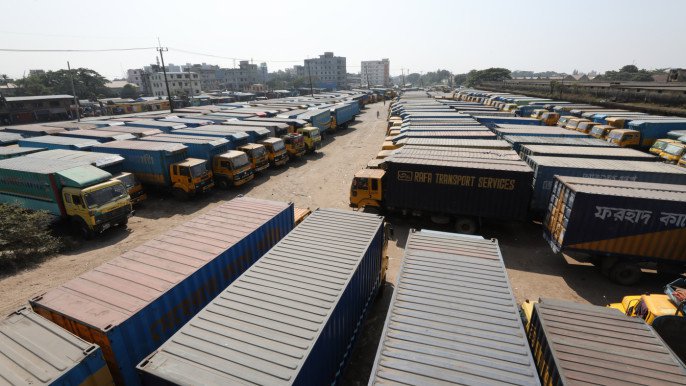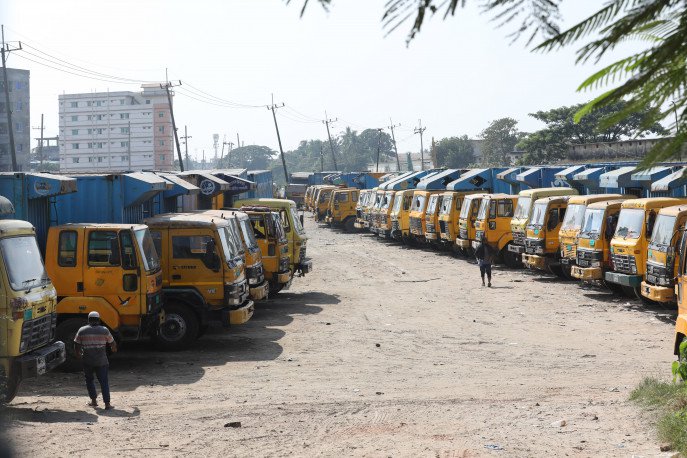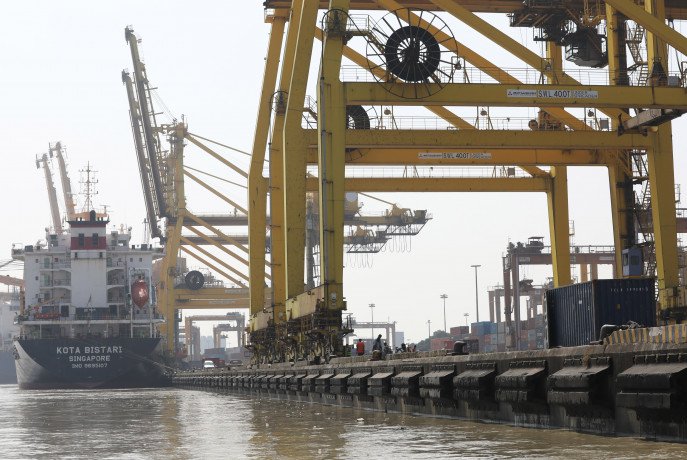
RMG makers send SOS as strike disrupts export-import

CHITTAGONG : The Narayanganj-based knitwear exporter Wisdom Attires Ltd had been scheduled to ship about $0.6million worth of products by Sunday from Chattogram Port to a Spanish buyer. Amid the nationwide transport strike there is now uncertainty in sending the goods to the port city from the factory near Dhaka.
“We are in deep uncertainty as to when this strike will be withdrawn and we will be able to send goods,” the company’s Director, Md Akhter Hossain Apurbo, told .
Like Wisdom Attires Ltd, Adzi Trims ltd, a leading accessories manufacturer, is also worried as its two trucks full of raw materials, on the way from Chattogram port, had been stuck in Cumilla .
The Managing Director Al Shahriar Ahmed visited the trucks and arranged for them to finally move after 12:30am. It was a risk, but one that had to be taken .
Al Shahriar Ahmed said, “The two trucks finally reached the factory early on Saturday morning at around 4:00am. They were stuck in Cumilla for 24 hours due to the ongoing nationwide transport strike.”
Akhter Hossain Apurbo, who is also the newly-elected vice president of the Bangladesh Knitwear Manufacturers and Exporters Association (BKMEA), added that due to the fuel cost hike, every supplier was saying that he cannot charge the same prices as production costs have gone up.
Saying this will have a negative impact on the country’s economy, he urged the government to find a solution to the crisis.
This will create difficulties for export, as well as import and commodities, businesses, he added.
Apurbo said medium and small knitwear factories have run into trouble sourcing raw materials, as they need to replenish supplies after every 2-3 days, while large factories have the capacity to store raw materials for 7-10 days.
Explaining the issue, he said each product requires various accessories — buttons, packaging materials, etc, — and if there is a shortage of any one thing, then it is not possible to produce a garment.
The BKMEA vice president mentioned that about 70% members of the associations are small- and medium-factories.
Md Shahidullah Azim, vice-president of the Bangladesh Garment Manufacturers and Exporters Association (BGMEA), said, “The apparel industry’s local supply chain has been disrupted due to the ongoing nationwide transport strike.”
He said none of the exporters were able to shift goods to washing plant and embroidery units, while at the same time factories were now facing a shortage of accessories.
Azim feared that if the transport strike is not withdrawn by Sunday, exporters and importers will again face container congestion at Chattogram port.
As per information, about 65 ships are waiting at the outer port for loading and unloading goods, he added.
Chief Executive Officer of Fatullah Apparels Ltd Fazlee Shamim Ehsan hoped the government will be able to negotiate with transport owners and workers. But the fuel price hike will put pressure on overall production cost, which will be another headache for exporters.
Mohamad Hatem, executive president of BKMEA, said a single day’s strike could affect at least $135 million worth of exports. If the ongoing transport strike is prolonged, there will be pressure from buyers to ship goods by air, which cost 55% of an export product’s price. Failure to do so will result in orders being delayed or even cancelled, he said.
Growing fears of another container congestion at Ctg Port
The nationwide transport strike, triggered by increased diesel and kerosene prices, has stopped container deliveries at Chattogram Port from the private Inland Container Depots (ICD).
The delivery of imported goods at the port has been suspended since Friday morning.
There are now growing concerns over container congestion at the port as well as on-time delivery of exports.
At the same time, disruptions in production are also feared since much of the raw materials are stuck at the port as well.
Kazi Mahmud Imam Bilu, joint general secretary of the C&F Agents Association, told The Business Standard that there will be 10-12,000 containers stranded at the port if the strike continues on Sunday.
“Earlier, the delivery of goods was halted due to various issues related to transport workers,” he said, adding that the country’s economy will be severely affected if these stagnations keep occurring one after another.
Chattogram Port Authority Secretary Md Omar Faruque said, “The unloading of goods from ships and customs duty activities have not been affected yet.”
Chattogram Customs House Deputy Commissioner Salahuddin Rizvi said there may be a negative impact on the amount of bill of entry submissions if the strike continues.
Meanwhile, containers of export goods from 19 private ICDs have been unable to enter the port due to the strike.
Usually, about 2,000 export containers enter the port every day. Although some vehicles entered the port on Friday, no vehicles arrived on Saturday. This has led to uncertainty about export goods reaching their destinations.
Ruhul Amin Sikder, secretary general of ICD owners’ organisation, said, “About 5,000 vehicles from 19 ICDs travel to the port every day for export and import activities, and transporting empty containers from Chattogram port. Not a single vehicle came to the port till 11:30 am on Saturday.”
He added, “The container capacity of ICDs is 78,700 TEUs [twenty-foot equivalent]. As of Saturday, there were about 51,000 containers in the ICDs. If the strike is prolonged by three to four days, the ICDs will be crowded.”
Syed Mohammad Arif, chairman of the Bangladesh Shipping Agents Association, said, “Ships cannot leave the port on time unless export containers arrive at the port’s hook point. Otherwise, the ships will leave the port without taking the export goods. If a ship waits for more than a day, it will have to pay a fine of $10- 12,000 thousand depending on its size.
“On the other hand, if the ship leaves without the export goods, those cannot be delivered to foreign buyers within the fixed time. Exporters will have to face financial losses.”



